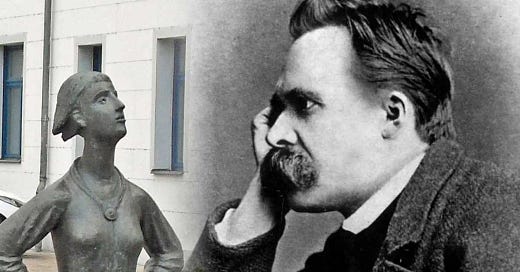God is dead, maybe.
Consequences of your beliefs (ft. Nietzsche, Kierkegaard, Sartre, Samuel)
Let’s talk about God–an often polarizing topic where people’s passion to prove His existence matches those who want to disprove it. (Now, I understand that God could be a woman or genderless, but while the OG existentialists were writing about the concept of God, they presumably believed God to be a "he,” which is why I am sticking to this singular pronoun for the purpose of the essay.)
Today, I am not interested in debating if the monotheistic God is real and what His nature is (although I did ace my monotheistic religion course back in the day, ha!). Rather, I am curious about the consequence of choosing to believe in God–or not.
As always, existentialists have a lot to say about a lot…including this very topic (despite their varying positions on His existence). So, let’s get started.
Nietzsche's God is Dead
Most people would summarize the existential perspective on God as a figment of the human imagination or a culturally constructed concept–a convenient way to surrender our freedom and our responsibility, or worse yet, be controlled by society. Others would, no doubt, quote Nietzsche declaration in his work Thus Spoke Zarathustra (1883): “God is dead,” but let’s explore the various versions of this quote and why he said it.
Here is where the famous phrase shows up:
“Could it be possible! This old saint in the forest hath not yet heard of it, that God is dead!” p. 6.
“God is dead: of his pity man hath God died.” p. 96.
In his work, The Gay Science (1887) –often referred to as Joyous Wisdom – he wrote something similar about God:
“God is dead: but given the way people are, there may still for millennia be caves in which they show his shadow.” p. 108.
“God is dead! God remains dead! And we have killed him! How can we console ourselves, the murders of all murderers! The holiest and the mightiest thing the world has even possessed has held to death under our knives: Who will wipe this blood from us?” p. 120.
As I understand it, Nietzsche's proclamation of God's death is not a literal assertion but a symbolic reflection on the waning influence of traditional religious values in the face of advancing scientific and cultural shifts. He thought that the belief in the Christian God has become unbelievable and that the impact of this disbelief was tangible in Eruope. According to Nietzsche, God's death signifies humanity's need to embrace its responsibility in creating meaning and values. Rather than mourning the loss of a transcendent deity, Nietzsche challenges people to recognize the potential for human agency in shaping a meaningful existence.
In the Gay Science, he states:
Indeed, at hearing the news that the old god is dead', we philosophers and 'free spirits' feel illuminated by a new dawn; our heart overflows with gratitude, amazement, forebodings, expectation - finally the horizon seems clear again, even if not bright; finally our ships may set out again, set out to face any danger; every daring of the lover of knowledge is allowed again…” (p. 343).
For Nietzsche, the death of God (the death of believing in God/ the concept of God) was a celebration of freedom and possibility. I really enjoy his enthusiasm, but does it mean that God must be dead before we can genuinely and authentically engage in life? Kierkegaard would have probably said no.
Kierkegaard's Leap of Faith
Some are surprised to know that the father of existentialism, Søren Kierkegaard, was a Danish theologian (amongst other things). His faith shaped how he lived his life and what he thought about the world. His conceptualization of faith invites individuals to reflect on their subjective and individual experiences. He was less about proving God with empirical evidence and more about chalking it up to a personal, passionate leap of faith. In his seminal work “Fear and Trembling” (1843), he explores the biblical story of Abraham and posits that true faith involves a willingness to embrace the absurd and make choices beyond rational understanding. Kierkegaard encourages us to consider the leap of faith not as a blind submission but as a courageous act of authentic engagement with the divine.
In his later works, Kierkegaard proposes that an authentic life is one lived in accordance with the Divine (otherwise it is not authentic). This existential approach challenges people to explore the depths of their own beliefs and confront the uncertainties that accompany the pursuit of God (but Kierkegaard by no means implies that it’s not a noble or worthy pursuit).
Sartre's Existential Atheism
Jean-Paul Sartre, a key figure in existentialist philosophy, takes a bold stance on God’s existence. In his atheistic worldview, Sartre argues that existence precedes essence, meaning that human beings first exist and then define their essence through their choices and actions. In this framework, the notion of a preordained purpose imposed by a divine being is rejected in favor of individual freedom and responsibility.
He doesn’t believe that God is dead; he doesn’t believe that God exists at all.
Sartre’s existential atheism challenges us to embrace the inherent freedom and responsibility that come with our existence. Rather than seeking external validation or divine guidance, we are encouraged to take ownership of our lives and craft our narratives while facing the absurdity of life.
So, what now?
I don’t find the topic of God interesting because I am trying to figure out my salvation (if you really want to hear my thought on that, let me know in the comments), but because I think the question of God is centred around the concept of meaning and responsibility. Is there inherent meaning? Is there an absolute ‘right’ and ‘wrong’? Is there a moral or immoral way to live? Are we created in God’s image? Is our essence determined, or is it constructed?
As with anything, there isn’t just one answer, and we are responsible for the answer we choose to accept.
Whatever we choose to believe will shape our existence.
Last Friday night, I was having a philosophical debate with a bunch of friends about God, and redownloaded the Bible app on my phone. As the app opened, the “verse of the day” popped up:
“The Lord came and stood there, calling as at the other times, “Samuel! Samuel! Then Samuel said, “Speak, for your servant is listening.” (1 Samuel 3:10 NIV).
A little background on Samuel. Samuel was in bed one night when he heard his name being called. Every time he heard the voice, he ran to his teacher Eli and said: “Here I am: you called me,” but his master would tell him that he didn’t call him and that he should go back to bed. After multiple rude awakenings, the teacher finally clued in (that it was God who was calling Samuel) and instructed him to answer by saying, “Speak, Lord, for your servant is listening.”
The calling was the same, but the source was now identified.
The calling was the same, but the answer was now different.
I found this story applicable. We all have an inherent calling to make sense of the world and find meaning in our lives (we have actually seen high rates of suicide when people fail to do so). Many of us keep answering our call in a way that doesn’t initially satisfy us (running back to Eli sort to speak) – this can look like seeking meaning in jobs, kids, relationship, status, money, religion, etc.
Let’s not take that as proof that there is no meaning and that it cannot be constructed, it just means that sometimes we fail to do so.
Paris. July, 2023.
As I said, I am less interested in teasing out whether God exists and more interested in how believing in the divine (or not) impacts our lives. For some, religion is an attempt to surrender their freedom, avoid responsibility, and not have to face the absurdity of life. For others, it’s a deliberate decision reached through discernment, full of intentionality and responsibility of showing up in alignment with their beliefs.
Now, others may find comfort and freedom in the fact that “God is dead” because they confuse this statement with a lack of accountability. If no one will punish them or tell them what they can and cannot do, they treat their existence with a lack of relevance… while others work twice as hard to construct their meaning despite the absurdity.
So, does it truly matter if God is alive or dead?
What matters more is how humans choose to interpret God or His absence, and how they show up in the world as a consequence.
Whatever you believe, let it be on purpose.
Whatever you believe, let it be your path to meaning (the psychotherapist in me can’t help herself). Experiment, take responsibility, and use up your freedom.











Ready and waiting for the salvation follow-up!
This was interesting, thanks! I think you are right that 'God' had to die before we could be free, although we have not gone on to achieve that freedom, at least not in the Nietzschean sense. In The Twilight of the Idols, Nietzsche reveals what he meant by the death of God. He was referring to the death of the 'true world' of metaphysics; that is, the eternal, unchanging and invisible world of which our apparent world is merely a cheap copy, as Plato would have it, has died (in the hands of science). There's a problem with the death of the 'true world', or the death of God, however you want to put it: what happens to the apparent world if the true world is dead? Nietzsche writes: “We have suppressed the true world: what world survives? the apparent world perhaps?... Certainly not! In abolishing the true world we have also abolished the world of appearance!” So in the end we are left with nothing (hence nihilism is our problem). Nietzsche sets us the task of creating new "worlds", I suppose, or "new sacred games" as he called them, in order to have meaning again. What has happened is that we did indeed kill God and substituted ‘it’ with science, but this has failed to create meaning. Science cannot answer the question of the meaning of life; why life instead of death in the first place? In this respect, Nietzsche is still way ahead of us moderns.